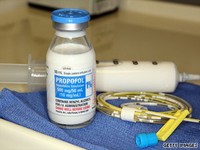One of the world’s and the UK's largest pharmaceutical companies has taken steps to ensure its drugs cannot be used to carry out executions by lethal injection.
Teva, which describes itself as a “top 10 global pharmaceutical company [with] $20.3bn in sales in 2012,” will put in place distribution controls to ensure its products cannot be used to kill prisoners on America’s death rows.
Teva is recommencing production of an anaesthetic called propofol, which in large enough doses can be used to kill. As supplies of other execution drugs run out, US prisons are starting to turn to propofol to carry out capital punishment.
The move brings the Israel-headquartered firm – which is also “one of the biggest pharmaceutical companies in the UK” – into line with other pharma companies including Lundbeck and Fresenius Kabi, who have taken effective steps to block the use of their products in executions.
Teva has stated that they too will establish procedures ‘to help prevent propofol from being sold to correctional institutions for use in executions and sell only to acute care hospitals, clinics and healthcare facilities where the products use is medically necessary.’ Their efforts mirror those of German manufacturer, Fresenius Kabi, which already controls distribution of propofol to prevent its sale to prisons for use in executions.
Maya Foa, Deputy Director of Reprieve’s Death Penalty Team said: “This is good news, and demonstrates Teva’s genuine commitment to corporate ethics. Teva has shown that – like any responsible pharmaceutical company – it wishes to be in the business of saving lives, not ending them in executions. The welcome move shows that companies which don’t wish to prop up the US death penalty system can take simple, practical steps to ensure their products are not used to kill prisoners, as a number of companies have now done.”










